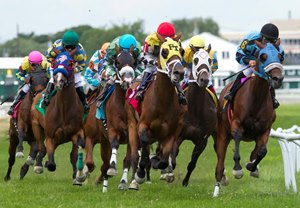The Stronach Group Maintains Interest in New England


Despite not filing for live 2018 racing dates in Massachusetts by the Oct. 1 deadline, The Stronach Group maintains it still wants to expand its influence into New England in the future.
"The Stronach Group is still extremely interested in the Massachusetts market. We believe the Boston area is a great sports market and has enough support for a track if it was run properly. We will continue to explore our options to bring a full schedule of racing back to the Commonwealth," said Tim Ritvo, the chief operating officer of The Stronach Group.
Earlier in the year, Ritvo toured Raynham Park, the former greyhound track in Taunton, Mass., with owners George Carney and his son, Chris, to determine if the racing strip could be reconfigured to a six-furlong, or perhaps seven-furlong Thoroughbred track, and see if the property could accommodate barns and other necessary structures and amenities.
Chris Carney said his discussions with Ritvo, who later met with state officials, involved a revitalized Raynham Park hosting a meet of no more than 30 days and their continued conversations centered on an all-turf meet.
"Unfortunately, under the current legislation, which requires a mile track and 100 days of racing, and not knowing if we would be afforded the simulcasting and ADW market, it was impossible to apply for the 2018 racing license," Ritvo said.
Meanwhile, Suffolk Downs submitted its formal application to the Massachusetts Gaming Commission last week and requested six days of live racing, with the possibility of adding more during the season. On Oct.1 Suffolk Downs concluded its eight-day 2017 live meet.
Sterling Suffolk Racecourse has been leasing the racing and simulcasting operation at Suffolk Downs since the property was sold to a major Boston real estate development company for $115 million last spring, and Sterling Suffolk still holds the simulcasting and advance deposit wagering account rights.
After being denied the sole Boston area casino license by the MGC in September 2014, the principals in Sterling Suffolk announced that live racing was no longer economically feasible and the property would be sold. In 2015 and 2016 Suffolk ran a live meet of six days per year.
Chip Tuttle, the COO of Suffolk Downs, said that it is unrealistic to expect that live racing can continue at the track that opened in 1935 once the 2018 meet comes to an end. Sterling Suffolk intends to retain simulcasting and ADW rights.
"I really can't see any possibility of live racing beyond next year," Tuttle said. "After 2018 we are hoping to continue as a simulcast-only facility on site, or if that's not available, then somewhere else. We've had conversations with the horsemen, who are pursuing their own facility somewhere else in the state about that."
The horsemen in New England are splintered into adversarial groups, with the New England Horsemen's Benevolent and Protective Association contracted with Suffolk Downs on purse agreements and the Massachusetts Thoroughbred Horsemen's Association allied with the Carney family, which holds two agricultural licenses allowing 15 days of live racing each.
The NEHBPA continues to move forward with its plans to fund and develop a new racetrack and equine center in another part of the state.
Nonetheless, all of the owners, trainers, breeders, and industry stakeholders are united in the opinion that the state's Race Horse Development Fund, which is fueled by percentages of the burgeoning casino industry and has tens of millions of dollars in the coffers and is growing, is in serious jeopardy unless a larger number of live Thoroughbred racing dates are run annually.
A sizeable faction of state legislators has already attempted to redirect the RHDF funds, which supplies the daily average purse structure of about $500,000 at Suffolk Downs, to public sector programs. The legislation failed earlier in the year.
"We look forward to working with the horseman, breeders, legislators and regulators in the near future to restore racing so that everyone involved will be proud," Ritvo said.
